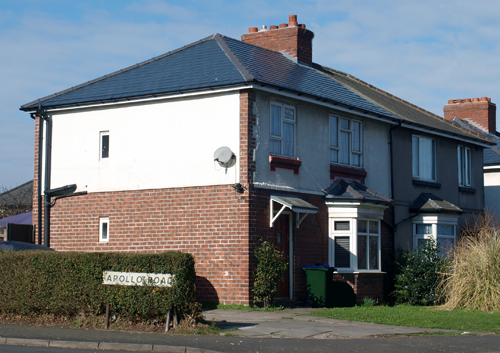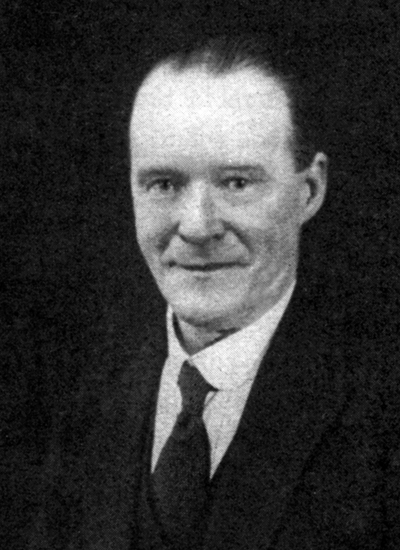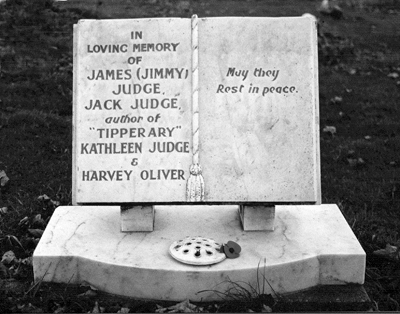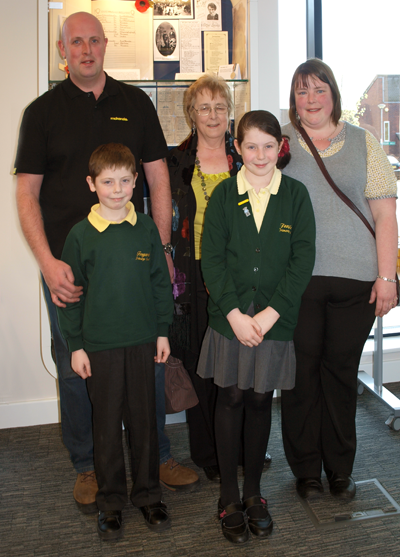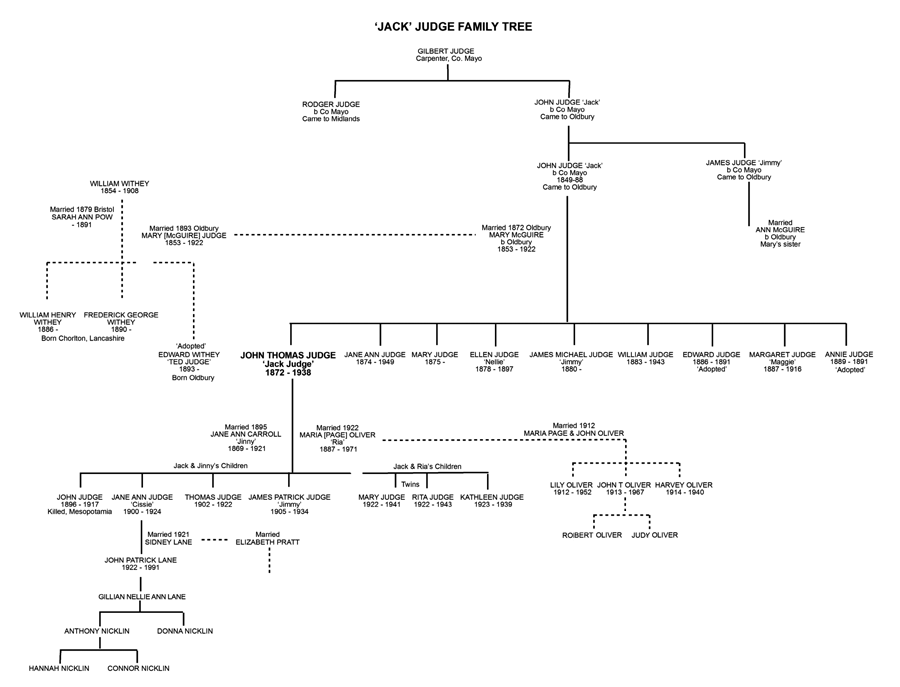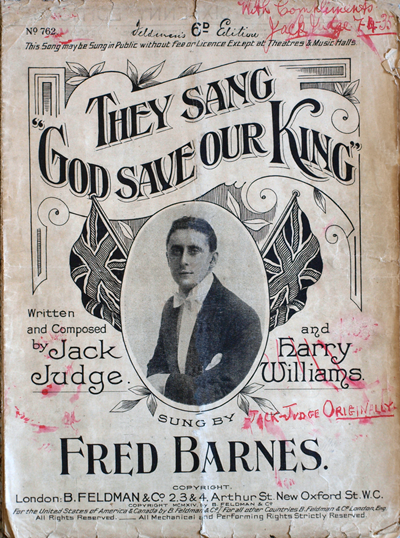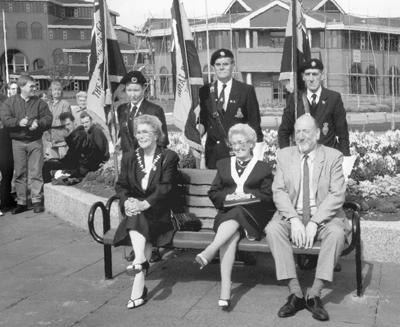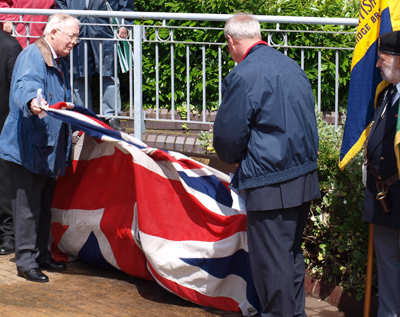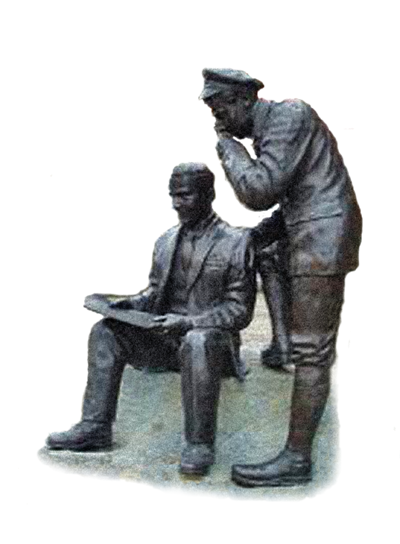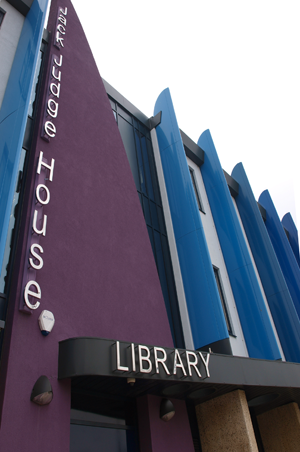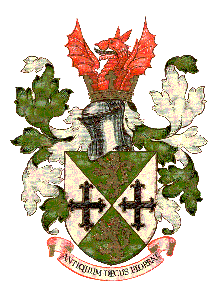
|
History
of Oldbury, Langley and Warley
|
||
|
Communities
of the West Midlands
|
||
|
The
website of Langley Local History Society - Oldbury Local History
Group - Old Warley Local History Society
|
||
 |
||
| HOME | |
| NEWS & EVENTS | |
| HISTORY SOCIETIES | |
| PUBLICATIONS | |
| GALLERY | |
| QUESTIONS | |
|
article 008 - Part 4 JACK JUDGE - HIS LIFE AND MUSIC
|
|
PART
FOUR - FAREWELL
|
||||||||||||||||||||||||||||
|
Jack Judge 1872 - 1938
Farewell
In 1928, Jack, Ria and family moved from the house in Low Town, where Jack had spent most of his life, to a new modern council house, 21 Victoria Road, Rood End. He christened it 'Tipperary Gardens', and this is the address he gives on pamphlets of this time. It was very different from Low Town, being opposite an entrance to West Smethwick Park, where Jack used to spend time feeding the birds in all weathers.
In the late twenties, Jack started to suffer from a bad throat: his voice was getting huskier, and he was able to undertake fewer public performances. In 1930 he was diagnosed with a cancer at the base of the skull, and underwent a long course of radium treatment. By 1934 the disease spread to his left eye, and he had to have it removed. To celebrate the King's Silver Jubilee in 1935, a film, 'Cavalcade', was made. This featured events of the King's reign, and included a sequence about the composition of 'Tipperary', re-enacting the first run-through of the song with Bert Feldman and Florrie Forde in Feldman's office. Bert and Florrie played themselves, but Jack was too changed in his features by his illness, and Ted Judge took his part. After singing 'Tipperary' with the word 'long' repeated all his life, Ted found it very difficult for this scene to sing the original version with only one 'long' that Jack had first presented to Bert Feldman. Jack retired from the fish business in 1937, and his sister, Jane Ann Keogh, took it over. The family moved again, this time to a four-bedroom house at 30 Harrold Road, Whiteheath, where there was more room for Jack, Ria and the six children. Jack's health deteriorated very quickly, and in July 1938 he was admitted to Hallam Hospital, West Bromwich, where he died shortly afterwards. He was 65. Jack's funeral took place from St Francis Xavier Church in Oldbury, and he was buried at Rood End Cemetery. Crowds of people lined the route and packed the graveyard, and there were hundreds of floral tributes, including a large shamrock-shaped one from Florrie Forde. Messages of condolence came from King George VI, from across the profession, and from the general public to add to those of his family and friends.
Jack had outlived all his children with his first wife, Jinny. He left Ria with three girls of his and three children by her first marriage. Tuberculosis had claimed his daughter Kathleen Judge and his stepson Harvey Oliver by 1940, and the twins died soon afterwards, Mary in 1941, aged 18, and Rita two years later. Ria's daughter, Lily Oliver, died childless in 1952. His stepson, John Thomas Oliver, known as 'Jack', had two children, Robert and Judy, Jack's step-grandchildren, and he died in 1967. Ria out-lived all her children by both marriages, dying in 1971 at the age of 83. By 1943, all of Jack's own children were dead, leaving only one grandson, John Patrick Lane, to carry on the Judge blood-line. John died in 1991, but had one daughter, Gillian, who has two children and two grandchildren, making five living direct descendants of Jack Judge in 2011.
Controversy Jack's music hall songs were kept alive by Ted Judge and the other artists who continued to perform them. But now, as the music hall has died, so have all Jack's songs, except 'Tipperary', which retains it reputation through its association with the Great War. Jack was not a great writer, but he was a great entertainer, capable of holding an audience, and of catching the spirit of the age in his songs and verses. For a decade, he brought joy to those who heard him on the professional stage, and for much longer to those who heard his songs or saw him in local concerts and performances. 'Tipperary' attracted both mystery and controversy. The mystery surrounds the exact circumstances of its composition. Jack confirmed that 'It's a long way to Tipperary' was written as a bet at Stalybridge in 1912, but, naturally, said nothing about any previous versions. However, there is such strong anecdotal evidence for a similar song before 1912, that it is almost certain that he developed it from an earlier song. One hundred years on, we shall never know the full story! The controversy concerns the contribution of Harry William to the writing of 'Tipperary' and the other of Jack's songs between 1905 and 1917. Given that Jack could not read music, there is likely to be some contribution in writing down the melodies that Jack sung and tapped out, most probably in the arrangement and harmonisation of the tune. A harmonised version would be essential if Jack were to be accompanied by piano or band, and this was the type of contribution later made by Jack Jesson. This would be Harry Williams' part in the composition, but the melodies are so dependant on the words, that these were almost certainly composed by Jack. Again, a hundred years on, we will never know the full story. However, the controversy rumbles on with claims by Harry's descendants that Harry wrote the songs, 'Tipperary' in particular, and that Jack stole them. The hundredth anniversary of the writing of 'Tipperary' at Stalybridge falls on 31st January 2012, and will doubtless re-ignite the debate.
Most of the early references to 'Tipperary' cite Jack as author and composer, and Jack produced his original manuscript at the offices of the 'Birmingham Gazette' in 1914 . Jack was annoyed at the controversy over the authorship of 'Tipperary', and on a copy of 1913 song 'They all sang God Save our King', which he presented to Joseph Stanley, his nephew, in 1935, he had crossed out, in red ink, the name of Harry Williams, and added 'Jack Judge originally'. In a letter to 'The Stage', he said, "I was the sole composer of 'Tipperary', and all other songs published in our names jointly. They were all 95% my work, as Mr Williams made only slight alterations to the work he wrote down from my singing the compositions. He would write it down on music-lined paper and play it back, then I'd work on the music a little more ... I have sworn affidavits in my possession by Bert Feldman, the late Harry Williams and myself confirming that I am the composer ...". He continued to defend his authorship. In a 1933 interview with the Oldbury Weekly News, Jack said about 'Tipperary', "The words and music of the song were written in the Newmarket Tavern, Corporation Street, Stalybridge on 31st January 1912, during my engagement at the Grand Theatre after a bet had been made that a song could not be written and sung the next evening ...". On Harry Williams and his contribution, he said, "Harry was very good to me and used to assist me financially, and I made a promise to him that if I ever wrote a song and published it, I would put his name on the copies and share the proceeds with him. Not only did I generously fulfil that promise, but I placed his name with mine on many more of my own published contributions. During Mr Williams' lifetime (as far as I know) he never claimed to be the writer of the song ..."
Commemoration Despite the crowd that attended his funeral, there was no permanent memorial to Jack. Not even his grave was marked until two similar tombstones were placed on Jack's grave and Ria's grave by the Oliver family. Commemorating Jack Judge's life and achievements got off to a slow start in his home town! The first act of commemoration was on 31st January 1953 at both Oldbury and Stalybridge. In Oldbury, the Mayor laid a wreath on his grave. At Stalybridge, there were larger celebrations, when a memorial stone on the wall of the Newmarket Inn was unveiled by the London impresario Jack Hylton, who had been brought up in Stalybridge. Ted Judge spoke about his brother, and reminded the audience that Tipperary was their grandmother's home town. The memorial reads, "Remembering with pride Jack Judge, who in this street and building was inspired to write and compose the immortal marching song, 'It's a Long way to Tipperary.' He was also the first to sing it in public in the Grand Theatre opposite on January 31, 1912". Jack's life story was first brought together by the original Oldbury Historical Group in the 1950s and 60s, and Leslie Frost included much of their information in a series of articles in the Oldbury Weekly News in 1962. The main elements of his life were there, and Ted Judge was still alive to advise. Oldbury Historical Group were the prime movers in the erection of a memorial bench in the centre of Oldbury in 1962. This was later damaged by vandals, and finally replaced by a second bench in 1993, supported by Lloyds Bank, the Royal British Legion and the Richardson brothers. This bench was refurbished, re-sited nearer the Sandwell Council House, and re-dedicated in July 2009. Meanwhile, the old houses in Low Town were cleared in the late seventies, and two of the new streets nearby named 'Judge Close' and 'Tipperary Walk' in Jack's honour.
In 1998, the book 'Jack Judge, the Tipperary Man' by Verna Hale Gibbons (a descendent of the Carroll family) was published by Sandwell Community Libraries, and extended the story with more research into Jack's life and compositions.
At the end of 2005, Stalybridge stole a march on Oldbury by unveiling a bronze statue showing Jack writing a song with a WW1 soldier looking over his shoulder and playing a mouth organ. Finally, in March 2011, Sandwell Council opened its new library and offices in the centre of Oldbury in a building called 'Jack Judge House'. There are plans to erect the first two 'blue plaques' in Oldbury to commemorate Jack, at Low Town and Victoria Road.
Sources The information in this article has been taken from 'Jack Judge, the Tipperary Man' by Verna Hale Gibbons, from articles by Leslie Frost in the Oldbury Weekly News in 1962, from contemporary newspaper articles, from Gillian Nicklin (Jack's only great-granddaughter), from research and family papers of the Stanley family (descendants of Jack's sister, Jane Ann), and from personal research. Dates of births, marriages and deaths have been taken from these sources and the birth, marriage and death indices available online at freebmd.rootsweb.com, and from the on-line databases of ancestry.co.uk and familysearch.org.
Text and family tree in this format: © Dr Terry Daniels, 2011 Pictures and illustrations: © Various, as stated in captions Contact for permission to reproduce
If you have objects, photographs, records or other items associated with Jack Judge, please contact this website, since the local history societies of Oldbury are building up as complete an archive on Jack Judge as possible, and would like to add copies of anyitems to it. We are particularly interested in copyinging recordings of Jack's music.
|
